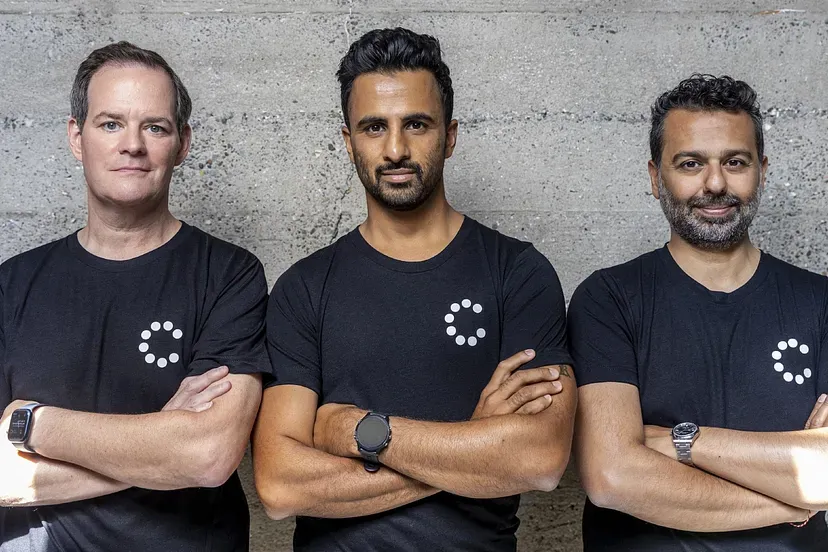If you’ve spent any amount of time running a start-up, you know just how taxing it can be.
The hours are long. The journey is lonely. If you want to make something happen, you depend on the person in the mirror to get it done.
It’s something repeat founder Ethan Agarwal knows well. With his first startup, audio fitness app Aaptiv, he went through the full rollercoaster: the ethereal highs and rock-bottom lows that become taxing over time. By the time Ethan sold Aaptiv, he’d developed a better sense of how to manage that emotional whiplash. With a clearer head, he was able to picture his next venture.
Like many startup founders, his next bright idea came from friction in his life. He sold Aaptiv, and while he had plenty of cash, equity, and other assets, he didn’t have a salary. When he went to apply for a mortgage, he was denied on the basis of not having a direct income.
“Almost everyone that I know makes a lot more money from their equity or their carry, or other assets, than from their salary.”
His latest venture, The Coterie, is a response to that different way of looking at a person’s net worth, breaking from salary-based calculations from lenders. The Coterie offers a wide variety of financial products. Clients can access larger funds that would typically be oversubscribed and have a high minimum investment. It also increases opportunities for managing wealth beyond the traditional solutions.
On an episode of the How I Raised It podcast, Ethan shares how he raised $50 million, how he looks after his physical, mental, and financial health as a founder, and his best advice for sticking it out over the long haul.
How Ethan raised it
The Coterie has raised $40 million in equity and $10 million in debt. Led by Andreessen Horowitz, the Series A fund saw participation from Initialized Capital, Pear VC, and Gradient Ventures. The Series A closed at $33 million in Q4 of 2021.
But, he admits, it was easier as a second-time founder than as a first-time. Compared to the hundred-plus funds he pitched for Aaptiv, the Coterie hardly had to pitch, receiving inbound requests to fund rather than having to reach out to firms.
As for the $10 million in debt, Ethan and his co-founders wanted debt as a resource instead of taking a whole lump sum of money. That way, they could draw out what they need when they need it, without being on the line for its performance the whole time.
As a veteran raiser, Ethan has a tip for rookies: don’t get greedy with your ownership percentage. Common advice says to hold onto as much equity as you can when doing your seed and Series A rounds. To a point, that’s true. But you need to give investors a reason to care about you.
“Even if you are successful in negotiating them down, you may actually be shooting yourself in the foot,” Ethan says. “A fund that owns 15% of a given company is going to be a lot less helpful than a fund that owns 25% of a company.”
Founder health first
Ethan encourages founders to take care of themselves throughout the startup journey. Not only does he think founders strain their mental and physical health, but also their financial well-being. Here’s how he’s managed those better as he’s gotten more experienced.
Physical health
14-hour days are almost a given in Ethan’s work, which he doesn’t necessarily mind — as long as his physical needs are met. To do that, he gets enough sleep and gets up early each morning to go for a run. And he keeps that running time sacred.
“I do my very best not to schedule meetings that early so that I can protect that time. Whereas previously, I would say, Oh, I'll skip my run, because I have to go to XYZ meeting, I'll just try to push that meeting so that it gets done. And it gets done — later,” Ethan shares.
Mental health
As a founder, it’s common to experience many highs and lows, even within a single day. At first, Ethan attached himself to that volatility, being elated when things were good and depressed when things were bad.
“There are too many of those [highs and lows] in a given day of a startup to do it healthily for five or seven or 10 or 15 years. I collapsed at work, and I had ulcers. It was a total mess because I was pushing myself so hard and not taking care of myself that I ultimately was just being unproductive, even though I thought I was going to be more productive,” he remembers.
To turn it around, Ethan hired an executive coach. He initially resisted, thinking needing that help was a sign of weakness. Now he knows that using an executive coach was both a sign of strength and made him stronger.
Financial health
When you change your career path to startup, there are inherent financial risks. The company may not be able to pay out dividends to founders for five to seven years, and you need to have plans for that. Ethan also pushes founders to protect assets by diversifying. If you put all your money in your own startup, there’s always the chance that you could lose it all.
Think for the long haul
It’s easy to get excited about a big idea and think of flipping your startup in a short time period. But Ethan encourages founders to look a little farther down the road.
“The number one advice I give people is to think about this as a long term investment. It's very easy to get enamored with rocket ship growth and rocket ship building, and you make decisions that are for the next three, six, or nine months. Both for your personal self and for the company, realize that this is actually a very long journey,” he says.
How far ahead does Ethan think? Several years. The quick churn and burn is rare, so longevity is key when developing your startup idea.
Can’t come up with an idea? Solve a problem, and make it a big one. Big problems take time to solve. Take that into account when you’re starting, and you’ll be less likely to be discouraged when you’re not an overnight success.
“You have seen a problem and you cannot believe that a solution does not exist for that problem. You can't think or go to sleep, because the problem and that solution are just glaring. And then you have said I have to go solve that problem.”
Nathan is also the CEO of Fundingstack.com which is a new platform for VCs and investment bankers to both raise capital and assist clients and portfolio companies.
Users of these platforms have raised over $9.7 billion since 2016.
This article is based on an episode of Foundersuite’s How I Raised It podcast, a behind-the-scenes look at how startup founders raise money.


